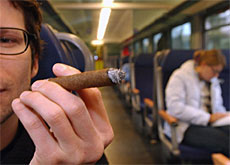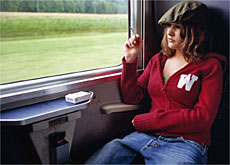National campaign targets passive smoking

Cigarette smoke is getting right up people’s noses, according to the Federal Health Office, which has launched a campaign against passive smoking.
The national anti-smoking drive is calling on non-smokers to stand up for their right to clean air.
It is using a series of television adverts and posters showing people holding their noses to get the message across that tobacco smoke is not only bad for people’s health but also antisocial.
“Although two-thirds of Swiss do not smoke, they are exposed to the dangers of tobacco through passive smoking,” the Federal Health Office said in a statement.
Philippe Vallat, head of the national anti-smoking programme, said the extent of the problem in Switzerland had only recently been discovered.
“About a quarter of the population is exposed [to tobacco smoke] for more than one hour a day, and we know that people underestimate the risk to their health of being exposed to second-hand smoke,” Vallat told swissinfo.
“So the aim of the campaign is to make people think about the effects of active and passive smoking.
“We hope smokers will have more respect for non-smokers, that non-smokers will defend their right to smoke-free air, and that people will support the different measures we plan to implement to fight tobacco consumption,” said Vallat.
Social problem
Surveys carried out in November 2003 and January 2004 for the Federal Health Office show that although a majority of Swiss are irritated by cigarette smoke in restaurants and bars, 72 per cent would not consider asking smokers around them to stub out their cigarettes.
And just a quarter of 14 to 65 year olds say they make a point of avoiding smoky restaurants.
The national campaign targets families with children, adolescents and young adults who tend to frequent places where smoking is commonplace. TV adverts show children playing at home and a young couple in a bar.
“Passive smoking is not just a health problem, it is also a social problem,” the statement said. “The campaign reflects everyday situations in which non-smokers are irritated by tobacco smoke.”
Harmful to children
Officials claim passive smoking is particularly harmful for children because their organs are not fully developed.
A separate fact sheet says around a quarter of all children breathe in cigarette smoke in the home.
According to the Federal Health Office, small children who are regularly exposed to tobacco smoke often have diminished lung capacity and suffer more from breathing problems, including bronchitis and pneumonia.
Even unborn babies are affected by their mothers’ smoking, with a higher risk of being born premature or underweight.
The survey also found a link between education levels and smoking: better-educated Swiss are less likely to smoke than those with only compulsory schooling.
But the better educated also make up the most hardened smokers, with just 47 per cent saying they wanted to give up compared with 60 per cent of their less educated compatriots.
The campaign forms part of a five-year programme, launched in 2001, to combat smoking in Switzerland through tax increases, restrictions on advertising and other measures.
Philippe Vallat told swissinfo that Switzerland’s federal structure meant the government could not follow the example of Ireland in banning smoking from all public places.
“What we recommend is the implementation of laws that would ban smoking in some public places, and we are working together with other authorities to ban smoking in the workplace,” he said.
swissinfo, Morven McLean
The advertising campaign, which runs until the end of June, is part of the national anti-smoking programme for 2001-2005.
It comprises two television adverts and a series of posters.
A second set of adverts will run between September and October.
According to Federal Health Office statistics:
Two million Swiss smoke.
Smoking causes 8,000 deaths a year in Switzerland.
The number of 15- to 19-year-olds who smoke increased from 23% in 1992 to 40% in 1997.
72% of non-smokers would not ask a smoker sitting near them in a restaurant or bar to stub out their cigarette.

In compliance with the JTI standards
More: SWI swissinfo.ch certified by the Journalism Trust Initiative

You can find an overview of ongoing debates with our journalists here. Please join us!
If you want to start a conversation about a topic raised in this article or want to report factual errors, email us at english@swissinfo.ch.